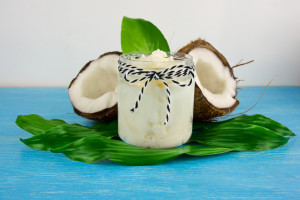Written by Greg Arnold, DC, CSCS. After 30 days of coconut oil pulling, study participants saw a 51.6% decrease in gingival index and a 60.3% decrease in plaque index.
 Coconut oil is an edible oil and dietary staple in many tropical countries for both cooking and cosmetic purposes 1. Coconut oil is unique from other dietary oils. The predominant fat in coconut oil is a medium chain fatty acid, whereas in the majority of other oils the basic building blocks are almost entirely long chain fatty acids 2. Coconut oil contains 92% saturated acids, approximately 50% of which is lauric acid, known to have anti-inflammatory effects and antimicrobial effects 3.
Coconut oil is an edible oil and dietary staple in many tropical countries for both cooking and cosmetic purposes 1. Coconut oil is unique from other dietary oils. The predominant fat in coconut oil is a medium chain fatty acid, whereas in the majority of other oils the basic building blocks are almost entirely long chain fatty acids 2. Coconut oil contains 92% saturated acids, approximately 50% of which is lauric acid, known to have anti-inflammatory effects and antimicrobial effects 3.
It is the anti-inflammatory and anti-bacterial properties of coconut oil that may make it effective for dental health. A 2015 study 4 involved 60 subjects (male/female breakdown not given) aged 16 to 18 with plaque-induced gingivitis who had a dental exam that resulted in “Modified Gingival Index” 5 and “Plaque Index” 6 scores. They were instructed over the course of 30 days to do a rinsing process with coconut oil called “pulling”, whereby they take a comfortable amount of oil/medicated oil and hold it or swish it in the mouth. When the oil turns thin and milky white, it is spit out without swallowing 7. The subjects were instructed to do the oil pulling once daily in the morning after brushing their teeth.
After 30 days, the researchers noted a 56.1% decrease in the gingival index (0.91 to 0.40, p = 0.0001) and a 60.3% decrease in the plaque index (0.98 to 0.39, p = 0.0001). When suggesting a mechanism for how coconut oil elicits these dental health effects, the researchers cited “the shearing force” by the swishing of the oil in the mouth which leads to its emulsification. This greatly increases the surface area of the oil, resulting in the oil film settling on the surface of the teeth and reducing plaque adhesion and bacteria buildup 8.
Although they did not use a control group in this study, which they admit was “a major limitation of our study,” the researchers concluded that “coconut oil is an easily usable, safe and cost effective agent with minimal side effects which can be used as an adjuvant in oral hygiene maintenance”. They added that “Further studies on coconut oil with a large number of subjects and comparative studies using various chemotherapeutic agents can improve the quality of evidence.”
Source: Peedikayil FC. Effect of coconut oil in plaque related gingivitis – A preliminary report. Niger Med J. 2015 Mar-Apr;56(2):143-7. doi: 10.4103/0300-1652.153406
© Nigerian Medical Journal
Posted July 18, 2016.
Greg Arnold is a Chiropractic Physician practicing in Hauppauge, NY. You can contact Dr. Arnold directly by emailing him at PitchingDoc@msn.com or visiting his web site at www.PitchingDoc.com.
References:
- DebMandal M, Mandal S. Coconut (Cocos nucifera L.: Arecaceae): in health promotion and disease prevention. Asian Pacific journal of tropical medicine. 2011;4(3):241-247.
- Pehowich DJ, Gomes AV, Barnes JA. Fatty acid composition and possible health effects of coconut constituents. The West Indian medical journal. 2000;49(2):128-133.
- Ogbolu D, Oni A, Daini O, Oloko A. In vitro antimicrobial properties of coconut oil on Candida species in Ibadan, Nigeria. Journal of Medicinal Food. 2007;10(2):384-387.
- Peedikayil FC, Sreenivasan P, Narayanan A. Effect of coconut oil in plaque related gingivitis—A preliminary report. Nigerian medical journal: journal of the Nigeria Medical Association. 2015;56(2):143.
- Lobene RR, Weatherford T, Ross NM, Lamm RA, Menaker L. A modified gingival index for use in clinical trials. Clinical preventive dentistry. 1986;8(1):3-6.
- Loe H. The Gingival Index, the Plaque Index and the Retention Index Systems. J Periodontol. 1967;38(6):Suppl:610-616.
- Sooryavanshi S, Mardikar BR. Prevention and treatment of diseases of mouth by gandoosha and kavala. Ancient science of life. 1994;13(3-4):266-270.
- Asokan S, Emmadi P, Chamundeswari R. Effect of oil pulling on plaque induced gingivitis: a randomized, controlled, triple-blind study. Indian journal of dental research : official publication of Indian Society for Dental Research. 2009;20(1):47-51.
